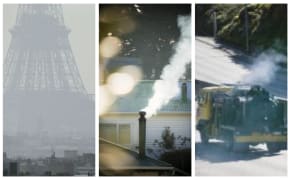The country is flying blind on environmental harm from tens of thousands of chemicals, a new report says.

Photo: rnz/befunky
The consequences include lakes overloaded with zinc, too much antibiotics in wastewater and unknown levels of harm to bees caused by poisoning from insecticide-dipped seeds.
The report from the Parliamentary Commissioner for the Environment Simon Upton says action is overdue to plug big gaps in the country's "disjointed and patchy system for asking, and answering, questions about the environmental fate and impact of chemicals".
"New Zealand has operated for a long time on the basis of 'what you don't know can't hurt you'," Upton told RNZ.
"I think it's precisely the opposite.
"You may need to find out rapidly what's been used and where. And if you haven't got the information, your investigation is hobbled from the beginning."

Parliamentary Commissioner for the Environment Simon Upton Photo: Supplied.
No one is keeping track, and they must start, Upton said.
His report recommends the Ministry for the Environment develop regulations to empower the Environmental Protection Authority to collate, collect and report on the quantity and use of chemicals.
Dr Nicholas Kim, who reviewed the report, said the public might be surprised the EPA lacks this power, and it was sorely needed.
Though 30,000 chemicals are approved for use, amounts aren't tracked, few are individually assessed for ecological risks and only around 200 are routinely tested for by regional councils, who are on the front line but poorly resourced, according to this and other reports.
"Pick a chemical, any chemical," said Kim, a senior lecturer in applied environmental chemistry at Massey University.
"If you ask me or any other researcher what we know about what's going on in the environment with that chemical, where it's ending up, what impacts it may be having, and what receiving environments are being impacted, and how - the usual answer is … we don't know.
"For well over 99 percent of the substances that are out there and in use, we simply don't know."
Kim called it "possibly a world-first" report that demands an end to flying blind.
Blindspots extended to not tracking chemical build-up over time, such as zinc, which has doubled in Waikato paddocks in 30 years due to its widespread use on livestock.
"A lot of blindness, a bit of science, a bit of guesswork, quite a lot of reliance on the fact that you don't see large-scale die-offs ... an assumption everything must be going well, because we haven't actually noticed everything dying," Kim said of the current system.
Upton is recommending the Government bring in a nationwide framework that weighs up how widespread a chemical is, how much harm it could do, and if it is showing up in soil and water systems.
"Using it, agencies should be able to arrive at a common understanding of how serious the environmental risks posed by any given chemical might be, and to target proportionate interventions," the report said.
Upton ordered the report to back up his call to government ministers in 2019 to look at setting up a pollutant register.
New Zealand is alone among OECD countries in not having one.
The lack of such data was a serious hurdle to today's 180-page report, Upton said.
"We had to go to extraordinary lengths to find this information.
"I'm on the case and I'm not going away from this, because everything I touch as Commissioner for the Environment, I'm discovering that we simply don't have the information that we need."
Moves to try to patch the gaping data holes extend back to at least 2014, when a national Environmental Monitoring and Reporting project was set up to plug them. It didn't.
As for Upton's 2019 call for a register, "nothing's happened so far", he said.
A separate report in 2019 for the Environment Ministry was scathing about the compliance, monitoring and enforcement system for chemicals.
It made more than 30 recommendations, but Upton said he was not aware they had been implemented.
The 2019 report found the system was fractured, cluttered and worst of all powerless in key ways.
"The most glaring issues include the lack of authority for enforcement agencies to act directly
and efficiently in order to abate or mitigate harm or the risk of harm to the environment or human
health (particularly in emergency situations)," it said.
Added to that was lack of any funding or cost recovery mechanisms for enforcement agencies, and lack of clear authority for the EPA to enforce the law.
[https://environment.govt.nz/acts-and-regulations/acts/environmental-reporting-act-2015/
Consultation is ongoing] about upgrading the Environmental Reporting Act.
MFE said it would consider the recommendations in today's report.
The Associate Environment Minister Phil Twyford said the Government will consider the report, which raised some important issues "which need to be addressed".






